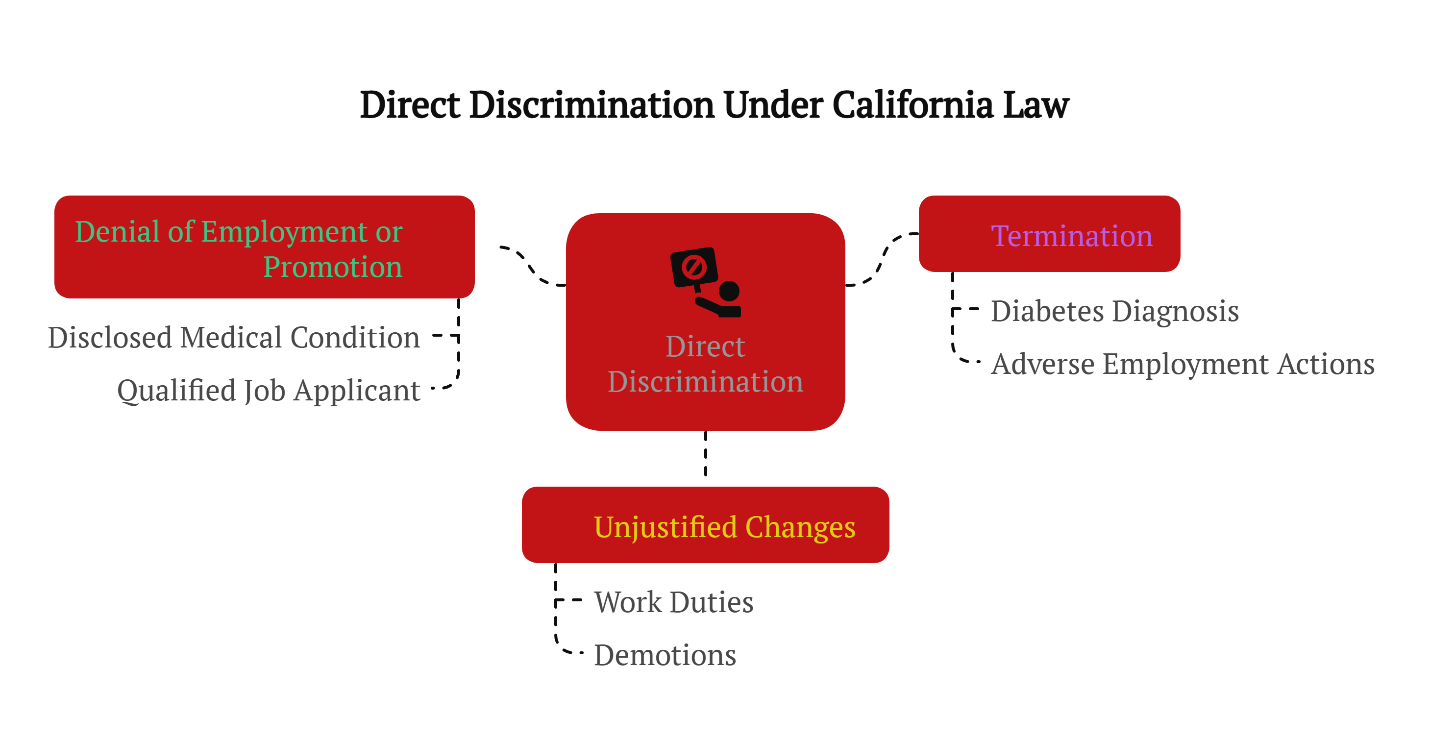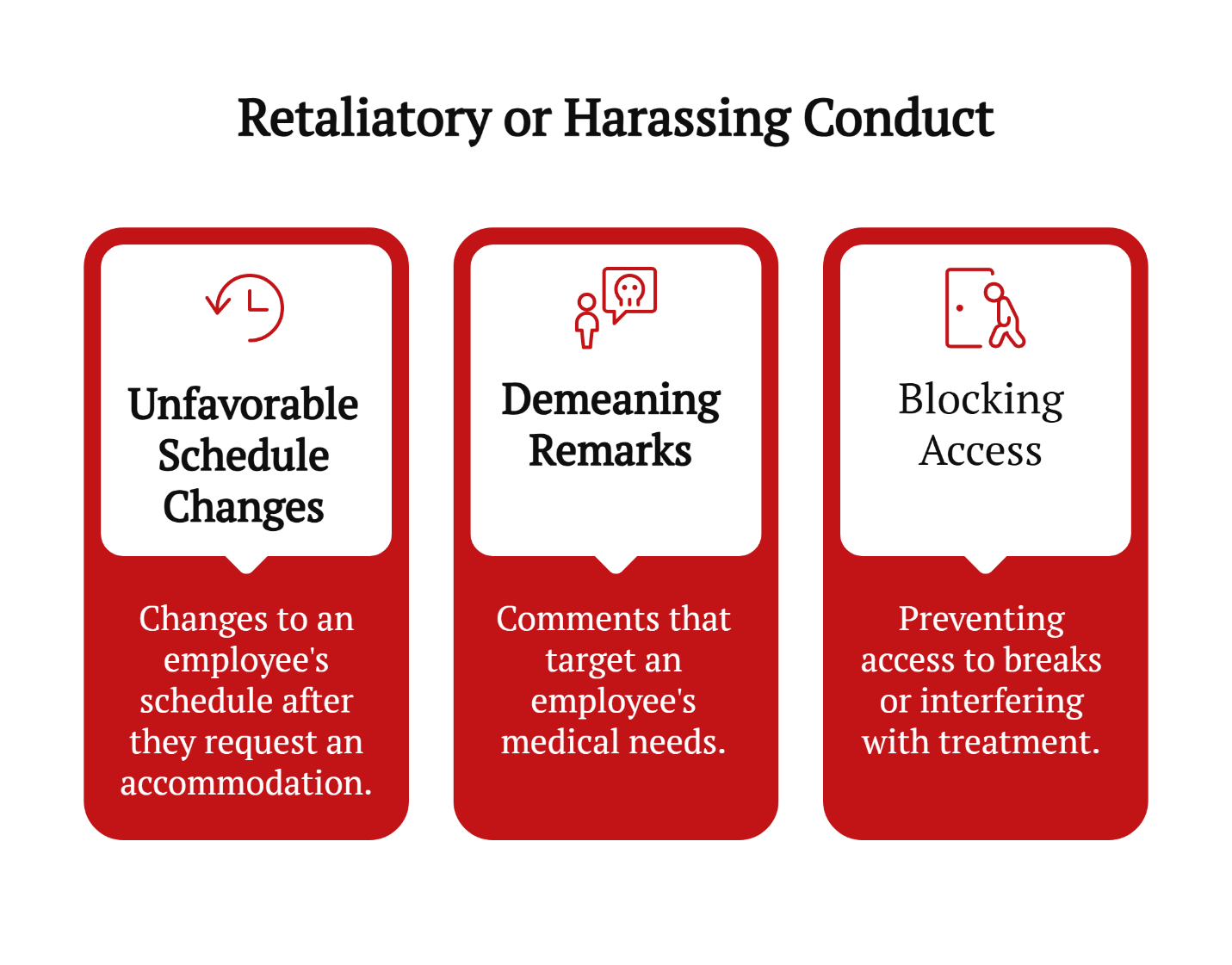📌 Key Takeaways
FEHA Offers Broader Protections Than Federal Law:
California’s Fair Employment and Housing Act (FEHA) may provide greater protection than the federal ADA by applying a more inclusive definition of disability and requiring a proactive, individualized approach from employers.
Diabetes-Related Discrimination May Violate State Law:
Employment decisions such as termination, demotion, or denial of promotion that are tied to a diabetes diagnosis could potentially violate Government Code §12940(a), especially if causation is established.
Reasonable Accommodations Must Be Seriously Considered:
Employers in California may be required to engage in a good faith, interactive process and assess accommodation requests on an individualized basis, rather than rely on general policies or assumptions.
Retaliation and Hostile Environments Are Also Covered:
FEHA may prohibit employers from punishing employees for asserting their rights, including requesting accommodations, and from fostering conditions that could lead to constructive discharge.
Legal Outcomes Depend on Specific Facts and Context:
Whether conduct constitutes a violation often depends on the causal connection between the employer’s action and the employee’s condition or protected activity—evaluated by the trier of fact.
This article offers information on how California law may protect employees with diabetes from specific types of employer conduct. For those navigating chronic medical conditions in the workplace, the full content can provide critical context and legal understanding.
Managing a chronic health condition like diabetes while working in a demanding professional environment can be daunting. When medical needs intersect with job responsibilities, questions about legal rights may arise—especially when an employer’s actions feel unfair. California law, particularly the Fair Employment and Housing Act (FEHA) under Government Code §12900 et seq., may provide legal protections for employees with diabetes under specific circumstances.
This article outlines three categories of potentially prohibited employer conduct under FEHA, relevant to employees managing diabetes. While general in nature, this information may help individuals better understand how California law could apply in employment contexts involving disability-related concerns.
California laws are subject to change. Individuals should verify current legal standards before making employment decisions or assumptions based on this information.
What Constitutes Direct Discrimination Under California Law?

FEHA prohibits employers from discriminating against an employee because of a physical disability, which may include diabetes when it makes it difficult to engage in major life activities. Unlike federal law under the Americans with Disabilities Act (ADA), FEHA generally adopts a broader definition of disability and provides enhanced protections to employees within California.
Direct discrimination may involve:
- Denial of employment or promotion due to a disclosed medical condition
- Termination shortly after disclosure of a diabetes diagnosis
- Unjustified changes in work duties or demotions linked to health status
Statutory protections under Government Code §12940(a) may apply when adverse employment actions are causally connected to a known or perceived disability.
Hypothetical scenario for illustration only:
A qualified job applicant voluntarily discloses their insulin-dependent diabetes during the interview process. The employer later informs the applicant that they are “too high-risk” for the position and hires someone else.
Real situations may involve additional complexities. Similar facts may lead to different outcomes in different jurisdictions. Consult with a qualified attorney about your specific situation.
What Might Constitute a Failure to Accommodate?
California law requires employers to provide reasonable accommodations for employees with qualifying disabilities. FEHA imposes this obligation (see Government Code §12940(m)) as well as the obligation to engage in a timely, good faith interactive process (see Government Code §12940(n)).
Reasonable accommodations for individuals with diabetes might include:
- Breaks for glucose testing or insulin administration
- Modified schedules to manage medication effects
- Permission to keep food or medical supplies nearby
A failure to consider or explore these requests in good faith could be viewed as noncompliance—particularly when no undue hardship can be shown.
Employers may be required to consider alternatives when they cannot implement the preferred accommodation requested by the employee. The law focuses on feasibility and effectiveness rather than convenience.
Hypothetical scenario for illustration only:
An employee with Type 2 diabetes requests minor adjustments to the lunch schedule to align with their insulin therapy. The employer denies the request without explanation or discussion.
What Employer Conduct Might Be Considered Retaliation or Harassment?

FEHA may also prohibit retaliation under Government Code §12940(h). This includes adverse actions taken against an employee after they engage in protected activity, such as requesting an accommodation or disclosing a disability. The law may also prohibit employers from creating or allowing a hostile work environment based on disability.
Retaliatory or harassing conduct could include:
- Unfavorable schedule changes following accommodation requests
- Demeaning remarks or comments targeting medical needs
- Blocking access to necessary breaks or interfering with treatment routines
These actions, if linked to protected activity, may support a claim of retaliation. The trier of fact may evaluate whether a causal connection exists between the employee’s protected conduct and the employer’s adverse response.
FEHA also recognizes constructive discharge as a form of potential liability. This may occur when a work environment becomes so objectively intolerable—due to discriminatory or retaliatory conduct—that a reasonable employee would feel forced to resign.
Statutory interpretations and legal thresholds are subject to change. Legal consultation is advised when assessing potential retaliation or hostile work environment claims.
Summary of Key Prohibited Conduct Under FEHA
California law may prohibit employers from engaging in conduct that adversely affects employees with diabetes in ways that violate FEHA protections. This may include:
- Discriminatory hiring, termination, or demotion based on medical condition
- Failure to provide or even consider reasonable accommodations
- Retaliation or hostile treatment following disclosure or request for assistance
These rights are not absolute, and legal outcomes often depend on individualized assessments. FEHA may require employers to demonstrate that decisions were based on legitimate, nondiscriminatory reasons, evaluated within the context of applicable accommodations and available resources.
This content is intended for informational purposes only and does not constitute legal advice. Always consult a qualified California employment attorney for an evaluation of your specific situation.
Frequently Asked Questions (FAQs)
What actions by an employer might violate California diabetes discrimination law?
Under Government Code §12940, California law may prohibit adverse employment decisions when they are linked to a diabetes diagnosis, particularly if diabetes qualifies as a disability. termination, demotion, or exclusion based on health status may be unlawful when lacking objective justification.
Are employers required to provide accommodations for employees with diabetes?
FEHA may obligate employers to offer reasonable accommodations and to engage in a collaborative, interactive process. Denials without individualized assessment or documentation of undue hardship could constitute a violation.
Disclaimer:
This content is for informational purposes only. This content is not legal advice. No attorney-client relationship is formed through this content. Please consult a qualified attorney in your jurisdiction for legal advice specific to your situation.
Protect Your Rights | The Akopyan Law Firm, A.P.C. | Top Gun Employment Lawyers
Have you been wrongfully terminated from your job? Have you suffered discrimination, harassment, or retaliation in the workplace? Has your employer violated wage and hour laws? If so, we can help. The Akopyan Law Firm, A.P.C. is dedicated to protecting and enforcing employees’ rights throughout Southern California. With a 97% success rate and millions recovered for our clients, our team of experienced and talented employment lawyers can fight to secure the justice you deserve.
Take the First Step Towards Securing Justice: Call us today to speak with one of our experienced employment lawyers. The firm offers case evaluations free of charge.
Contact Us Today:
- Phone: (818) 509-9975
- Office Locations: Los Angeles, Bakersfield, Costa Mesa, Temecula, Rancho Cucamonga, Oxnard, Culver City, and San Diego in California.
Important: Contacting the Akopyan Law Firm, A.P.C. does not create an attorney-client relationship, but all communications will remain private and confidential. Each case is unique. The Akopyan Law Firm, A.P.C., does not guarantee any outcome.

